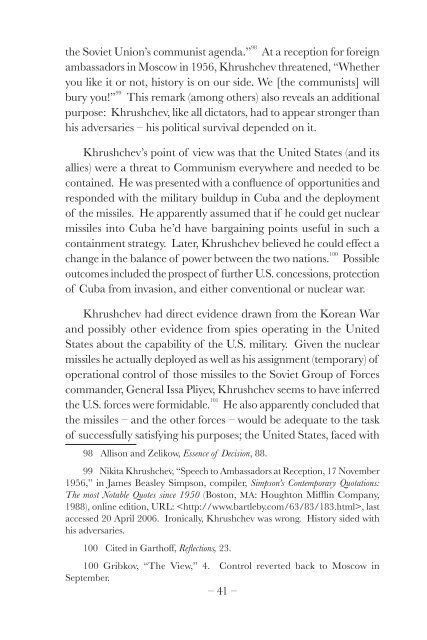Critical Thinking and Intelligence Analysis
Critical Thinking and Intelligence Analysis
Critical Thinking and Intelligence Analysis
You also want an ePaper? Increase the reach of your titles
YUMPU automatically turns print PDFs into web optimized ePapers that Google loves.
the Soviet Union’s communist agenda.” 98<br />
At a reception for foreign<br />
ambassadors in Moscow in 1956, Khrushchev threatened, “Whether<br />
you like it or not, history is on our side. We [the communists] will<br />
bury you!” 99<br />
This remark (among others) also reveals an additional<br />
purpose: Khrushchev, like all dictators, had to appear stronger than<br />
his adversaries – his political survival depended on it.<br />
Khrushchev’s point of view was that the United States (<strong>and</strong> its<br />
allies) were a threat to Communism everywhere <strong>and</strong> needed to be<br />
contained. He was presented with a confluence of opportunities <strong>and</strong><br />
responded with the military buildup in Cuba <strong>and</strong> the deployment<br />
of the missiles. He apparently assumed that if he could get nuclear<br />
missiles into Cuba he’d have bargaining points useful in such a<br />
containment strategy. Later, Khrushchev believed he could effect a<br />
change in the balance of power between the two nations. 100<br />
Possible<br />
outcomes included the prospect of further U.S. concessions, protection<br />
of Cuba from invasion, <strong>and</strong> either conventional or nuclear war.<br />
Khrushchev had direct evidence drawn from the Korean War<br />
<strong>and</strong> possibly other evidence from spies operating in the United<br />
States about the capability of the U.S. military. Given the nuclear<br />
missiles he actually deployed as well as his assignment (temporary) of<br />
operational control of those missiles to the Soviet Group of Forces<br />
comm<strong>and</strong>er, General Issa Pliyev, Khrushchev seems to have inferred<br />
the U.S. forces were formidable. 101<br />
He also apparently concluded that<br />
the missiles – <strong>and</strong> the other forces – would be adequate to the task<br />
of successfully satisfying his purposes; the United States, faced with<br />
98 Allison <strong>and</strong> Zelikow, Essence of Decision, 88.<br />
99 Nikita Khrushchev, “Speech to Ambassadors at Reception, 17 November<br />
1956,” in James Beasley Simpson, compiler, Simpson’s Contemporary Quotations:<br />
The most Notable Quotes since 1950 (Boston, MA: Houghton Mifflin Company,<br />
1988), online edition, URL: , last<br />
accessed 20 April 2006. Ironically, Khrushchev was wrong. History sided with<br />
his adversaries.<br />
100 Cited in Garthoff, Reflections, 23.<br />
100 Gribkov, “The View,” 4. Control reverted back to Moscow in<br />
September.<br />
– 41 –
















